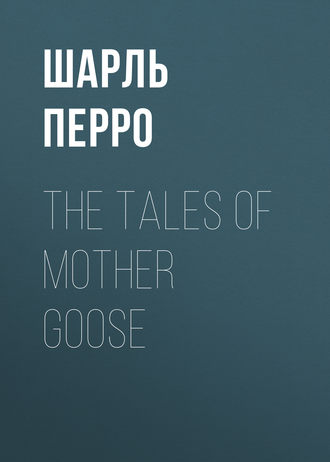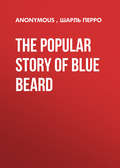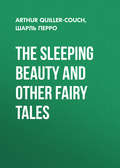
Шарль Перро
The Tales of Mother Goose
There are many people who do not agree in regard to this act of Little Thumb's, and pretend that he never robbed the Ogre at all, and that he only thought he might very justly take off his seven-leagued boots because he made no other use of them but to run after little children. These folks affirm that they are very well assured of this, because they have drunk and eaten often at the fagot-maker's house. They declare that when Little Thumb had taken off the Ogre's boots he went to Court, where he was informed that they were very much in trouble about a certain army, which was two hundred leagues off, and anxious as to the success of a battle. He went, they say, to the King and told him that if he desired it, he would bring him news from the army before night.
The King promised him a great sum of money if he succeeded. Little Thumb returned that very same night with the news; and, this first expedition causing him to be known, he earned as much as he wished, for the King paid him very well for carrying his orders to the army. Many ladies employed him also to carry messages, from which he made much money. After having for some time carried on the business of a messenger and gained thereby great wealth, he went home to his father, and it is impossible to express the joy of his family. He placed them all in comfortable circumstances, bought places for his father and brothers, and by that means settled them very handsomely in the world, while he successfully continued to make his own way.
THE MASTER CAT, OR PUSS IN BOOTS
Once upon a time there was a miller who left no more riches to the three sons he had than his mill, his ass, and his cat. The division was soon made. Neither the lawyer nor the attorney was sent for. They would soon have eaten up all the poor property. The eldest had the mill, the second the ass, and the youngest nothing but the cat.
The youngest, as we can understand, was quite unhappy at having so poor a share.
"My brothers," said he, "may get their living handsomely enough by joining their stocks together; but, for my part, when I have eaten up my cat, and made me a muff of his skin, I must die of hunger."
The Cat, who heard all this, without appearing to take any notice, said to him with a grave and serious air: —
"Do not thus afflict yourself, my master; you have nothing else to do but to give me a bag, and get a pair of boots made for me, that I may scamper through the brambles, and you shall see that you have not so poor a portion in me as you think."
Though the Cat's master did not think much of what he said, he had seen him play such cunning tricks to catch rats and mice – hanging himself by the heels, or hiding himself in the meal, to make believe he was dead – that he did not altogether despair of his helping him in his misery. When the Cat had what he asked for, he booted himself very gallantly, and putting his bag about his neck, he held the strings of it in his two forepaws, and went into a warren where was a great number of rabbits. He put bran and sow-thistle into his bag, and, stretching out at length, as if he were dead, he waited for some young rabbits, not yet acquainted with the deceits of the world, to come and rummage his bag for what he had put into it.
Scarcely was he settled but he had what he wanted. A rash and foolish young rabbit jumped into his bag, and Monsieur Puss, immediately drawing close the strings, took him and killed him at once. Proud of his prey, he went with it to the palace, and asked to speak with the King. He was shown upstairs into his Majesty's apartment, and, making a low bow to the King, he said: —
"I have brought you, sire, a rabbit which my noble Lord, the Master of Carabas" (for that was the title which Puss was pleased to give his master) "has commanded me to present to your Majesty from him."
"Tell thy master," said the King, "that I thank him, and that I am pleased with his gift."
Another time he went and hid himself among some standing corn, still holding his bag open; and when a brace of partridges ran into it, he drew the strings, and so caught them both. He then went and made a present of these to the King, as he had done before of the rabbit which he took in the warren. The King, in like manner, received the partridges with great pleasure, and ordered his servants to reward him.
The Cat continued for two or three months thus to carry his Majesty, from time to time, some of his master's game. One day when he knew that the King was to take the air along the riverside, with his daughter, the most beautiful princess in the world, he said to his master: —
"If you will follow my advice, your fortune is made. You have nothing else to do but go and bathe in the river, just at the spot I shall show you, and leave the rest to me."
The Marquis of Carabas did what the Cat advised him to, without knowing what could be the use of doing it. While he was bathing, the King passed by, and the Cat cried out with all his might: —
"Help! help! My Lord the Marquis of Carabas is drowning!"
At this noise the King put his head out of the coach window, and seeing the Cat who had so often brought him game, he commanded his guards to run immediately to the assistance of his Lordship the Marquis of Carabas.
While they were drawing the poor Marquis out of the river, the Cat came up to the coach and told the King that, while his master was bathing, there came by some rogues, who ran off with his clothes, though he had cried out, "Thieves! thieves!" several times, as loud as he could. The cunning Cat had hidden the clothes under a great stone. The King immediately commanded the officers of his wardrobe to run and fetch one of his best suits for the Lord Marquis of Carabas.
The King was extremely polite to him, and as the fine clothes he had given him set off his good looks (for he was well made and handsome), the King's daughter found him very much to her liking, and the Marquis of Carabas had no sooner cast two or three respectful and somewhat tender glances than she fell in love with him to distraction. The King would have him come into the coach and take part in the airing. The Cat, overjoyed to see his plan begin to succeed, marched on before, and, meeting with some countrymen, who were mowing a meadow, he said to them: —
"Good people, you who are mowing, if you do not tell the King that the meadow you mow belongs to my Lord Marquis of Carabas, you shall be chopped as small as herbs for the pot."
The King did not fail to ask the mowers to whom the meadow they were mowing belonged.
"To my Lord Marquis of Carabas," answered they all together, for the Cat's threat had made them afraid.
"You have a good property there," said the King to the Marquis of Carabas.
"You see, sire," said the Marquis, "this is a meadow which never fails to yield a plentiful harvest every year."
The Master Cat, who went still on before, met with some reapers, and said to them: —
"Good people, you who are reaping, if you do not say that all this corn belongs to the Marquis of Carabas, you shall be chopped as small as herbs for the pot."
The King, who passed by a moment after, wished to know to whom belonged all that corn, which he then saw.
"To my Lord Marquis of Carabas," replied the reapers, and the King was very well pleased with it, as well as the Marquis, whom he congratulated thereupon. The Master Cat, who went always before, said the same thing to all he met, and the King was astonished at the vast estates of my Lord Marquis of Carabas.
Monsieur Puss came at last to a stately castle, the master of which was an Ogre, the richest ever known; for all the lands which the King had then passed through belonged to this castle. The Cat, who had taken care to inform himself who this Ogre was and what he could do, asked to speak with him, saying he could not pass so near his castle without having the honor of paying his respects to him.
The Ogre received him as civilly as an Ogre could do, and made him sit down.
"I have been assured," said the Cat, "that you have the gift of being able to change yourself into all sorts of creatures you have a mind to; that you can, for example, transform yourself into a lion, or elephant, and the like."
"That is true," answered the Ogre, roughly; "and to convince you, you shall see me now become a lion."
Puss was so terrified at the sight of a lion so near him that he immediately climbed into the gutter, not without much trouble and danger, because of his boots, which were of no use at all to him for walking upon the tiles. A little while after, when Puss saw that the Ogre had resumed his natural form, he came down, and owned he had been very much frightened.
"I have, moreover, been informed," said the Cat, "but I know not how to believe it, that; you have also the power to take on you the shape of the smallest animals; for example, to change yourself into a rat or a mouse, but I must own to you I take this to be impossible."
"Impossible!" cried the Ogre; "you shall see." And at the same time he changed himself into a mouse, and began to run about the floor. Puss no sooner perceived this than he fell upon him and ate him up.
Meanwhile, the King, who saw, as he passed, this fine castle of the Ogre's, had a mind to go into it. Puss, who heard the noise of his Majesty's coach coming over the drawbridge, ran out, and said to the King, "Your Majesty is welcome to this castle of my Lord Marquis of Carabas."
"What! my Lord Marquis," cried the King, "and does this castle also belong to you? There can be nothing finer than this courtyard and all the stately buildings which surround it; let us see the interior, if you please."
The Marquis gave his hand to the young Princess, and followed the King, who went first. They passed into the great hall, where they found a magnificent collation, which the Ogre had prepared for his friends, who were that very day to visit him, but dared not to enter, knowing the King was there. His Majesty, charmed with the good qualities of my Lord of Carabas, as was also his daughter, who had fallen violently in love with him, and seeing the vast estate he possessed, said to him: —
"It will be owing to yourself only, my Lord Marquis, if you are not my son-in-law."
The Marquis, with low bows, accepted the honor which his Majesty conferred upon him, and forthwith that very same day married the Princess.
Puss became a great lord, and never ran after mice any more except for his diversion.
RIQUET WITH THE TUFT
Once upon a time there was a Queen who had a son so ugly and so misshapen that it was long disputed whether he had human form. A fairy who was at his birth said, however, that he would be very amiable for all that, since he would have uncommon good sense. She even added that it would be in his power, by virtue of a gift she had just then given him, to bestow as much sense as he pleased on the person he loved the best. All this somewhat comforted the poor Queen. It is true that this child no sooner began to talk than he said a thousand pretty things, and in all his actions there was an intelligence that was quite charming. I forgot to tell you that he was born with a little tuft of hair upon his head, which made them call him Riquet1 with the Tuft, for Riquet was the family name.
Seven or eight years later the Queen of a neighboring kingdom had two daughters who were twins. The first born of these was more beautiful than the day; whereat the Queen was so very glad that those present were afraid that her excess of joy would do her harm. The same fairy who was present at the birth of little Riquet with the Tuft was here also, and, to moderate the Queen's gladness, she declared that this little Princess should have no sense at all, but should be as stupid as she was pretty. This mortified the Queen extremely; but afterward she had a far greater sorrow, for the second daughter proved to be very ugly.
"Do not afflict yourself so much, madam," said the fairy. "Your daughter shall have her recompense; she shall have so great a portion of sense that the want of beauty will hardly be perceived."
"God grant it," replied the Queen; "but is there no way to make the eldest, who is so pretty, have any sense?"
"I can do nothing for her, madam, as to sense," answered the fairy, "but everything as to beauty; and as there is nothing I would not do for your satisfaction, I give her for gift that she shall have power to make handsome the person who shall best please her."
As these princesses grew up, their perfections grew with them. All the public talk was of the beauty of the elder and the rare good sense of the younger. It is true also that their defects increased considerably with their age. The younger visibly grew uglier and uglier, and the elder became every day more and more stupid: she either made no answer at all to what was asked her, or said something very silly. She was with all this so unhandy that she could not place four pieces of china upon the mantelpiece without breaking one of them, nor drink a glass of water without spilling half of it upon her clothes.
Although beauty is a very great advantage in young people, the younger sister was always the more preferred in society. People would indeed go first to the Beauty to look upon and admire her, but turn aside soon after to the Wit to hear a thousand most entertaining and agreeable things; and it was amazing to see, in less than a quarter of an hour's time, the elder with not a soul near her, and the whole company crowding about the younger. The elder, dull as she was, could not fail to notice this; and without the slightest regret would have given all her beauty to have half her sister's wit. The Queen, prudent as she was, could not help reproaching her several times for her stupidity, which almost made the poor Princess die of grief.
One day, as she had hidden herself in a wood to bewail her misfortune, she saw coming to her a very disagreeable little man, but most magnificently dressed. This was the young Prince Riquet with the Tuft, who having fallen in love with her upon seeing her picture, – many of which were distributed all the world over, – had left his father's kingdom to have the pleasure of seeing and talking with her. Overjoyed to find her thus alone, he addressed himself to her with all imaginable politeness and respect. Having observed, after he had paid her the ordinary compliments, that she was extremely melancholy, he said to her: —
"I cannot comprehend, madam, how a person so beautiful as you are can be so sorrowful as you seem to be; for though I can boast of having seen a great number of exquisitely charming ladies, I can say that I never beheld any one whose beauty approaches yours."
"You are pleased to say so," answered the Princess, and here she stopped.
"Beauty," replied Riquet with the Tuft, "is such a great advantage, that it ought to take place of all things besides; and since you possess this treasure, I can see nothing that can possibly very much afflict you."
"I had far rather," cried the Princess, "be as ugly as you are, and have sense, than have the beauty I possess, and be as stupid as I am."
"There is nothing, madam," returned he, "shows more that we have good sense than to believe we have none; and it is the nature of that excellent quality that the more people have of it, the more they believe they want it."
"I do not know that," said the Princess; "but I know very well that I am very senseless, and that vexes me mightily."
"If that be all which troubles you, madam, I can very easily put an end to your affliction."
"And how will you do that?" cried the Princess.
"I have the power, madam," replied Riquet with the Tuft, "to give to that person whom I love best as much good sense as can be had; and as you, madam, are that very person, it will be your fault only if you have not as great a share of it as any one living, provided you will be pleased to marry me."
The Princess was quite confused, and answered not a word.
"I see," replied Riquet with the Tuft, "that this proposal does not please you, and I do not wonder at it; but I will give you a whole year to consider it."
The Princess had so little sense and, at the same time, so great a longing to have some, that she imagined the end of that year would never come, so she accepted the proposal which was made her.
She had no sooner promised Riquet with the Tuft that she would marry him on that day twelvemonth than she found herself quite otherwise than she was before: she had an incredible faculty of speaking whatever she had in her mind in a polite, easy, and natural manner.
She began that moment a very gallant conversation with Riquet with the Tuft, which she kept up at such a rate that Riquet with the Tuft believed he had given her more sense than he had reserved for himself.
When she returned to the palace, the whole court knew not what to think of such a sudden and extraordinary change; for they heard from her now as much sensible discourse and as many infinitely witty phrases as they had heard stupid and silly impertinences before. The whole court was overjoyed beyond imagination at it. It pleased all but her younger sister, because, having no longer the advantage of her in respect of wit, she appeared in comparison with her a very disagreeable, homely girl.
The King governed himself by her advice, and would even sometimes hold a council in her apartment. The news of this change in the Princess spread everywhere; the young princes of the neighboring kingdoms strove all they could to gain her favor, and almost all of them asked her in marriage; but she found not one of them had sense enough for her. She gave them all a hearing, but would not engage herself to any.






